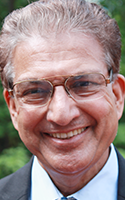As we age, we become more likely to develop several co-occurring health problems that feed each other. These are called ‘geriatric syndromes’
By Deborah Jeanne Sergeant

Each individual’s health differs; however, “geriatric syndromes” describe a group of health concerns experienced by manyolder adults that often have multiple causes and involve different bodily parts and systems.
These can include incontinence, sleep issues, cognitive issues, falls, osteoporosis and weight loss/frailty.
For an older adult, incontinence could contribute to sleep issues and falls. Or weight loss and frailty from poor eating is often linked to osteoporosis, which would worsen the effect of a fall and lead to further frailty after a hip fracture.
Stephen Ryan is a geriatrician practicing at Elder One with privileges at Rochester Regional Health. He compared the interplay among geriatric syndromes to that of conditions such as high blood pressure and diabetes.
“The effects are worse together than either separately,” Ryan said.
Ryan said that a general practitioner or internist may not connect the syndromes as causal or even relational, but view them as separate conditions. Treating them as such may reduce the overall effectiveness of the care provided to the patient. It can also contribute to secondary issues as more medications bring more side effects.
Of course, geriatricians are trained to recognize the relationships among various geriatric syndromes and the issues involved. However, not every senior can see a geriatrician.
“From my perspective and that of most of the national leadership groups, there will never be enough geriatricians to handle people who have more than one geriatric issue,” Ryan said. “The goal should be to improve the care of the majority of those who receive care from internists and general practitioners.”
With more of them looking for measurable symptoms like falls and osteoporosis, non-geriatricians can help patients prevent more complicated medical issues and, as needed, refer patients to geriatricians for more complex cases, where conservative measures seem less effective, according to Ryan.
Physician Az Tahir practices holistic integrative medicine at Campanella Wellness in Rochester. He believes that family members and caregivers should understand the concept of geriatric syndromes as well. For example, many different factors can influence an older person to fall. Tahir listed cataracts, muscle weakness and slower reaction time. He added that the outcome of falls can also relate to many other health concerns, such as broken bones because of osteoporosis, bedsores and further frailty.
“Falls are major cause of fractures and mortality and morbidity in old people,” Tahir said. “It’s important to prevent falls.”
Treating the patient can involve many aspects of care, too, such as reducing environmental hazards, balance improvement programs, eye exams, and bone density testing.
While some of these issues may be part of the normal aging process, geriatric syndromes aren’t, according to physician Daniel Ari Mendelson, William and Sheila Konar Family professor of geriatrics, palliative medicine, and person-centered xare in the division of geriatrics, department of medicine, University of Rochester School of Medicine & Dentistry and associate chief of Medicine, Highland Hospital.
“They often can be prevented or managed,” Mendelson said. “Sometimes older adults and doctors not familiar with geriatric syndromes assume things are happening because of aging are unchangeable.”
While doctors can’t manage and mitigate every aspect of a patient health — especially if the patient manifests complex, inter-related health issues — Mendelson wants more providers to improve quality of patient life in general.
“If you have two or three syndromes but only one impacts quality of life, you should focus on what’s important them,” he said. “Experience in geriatric syndromes and the interplay of normal aging and person-centered care defines good geriatric care.”
